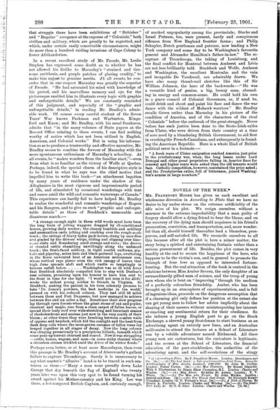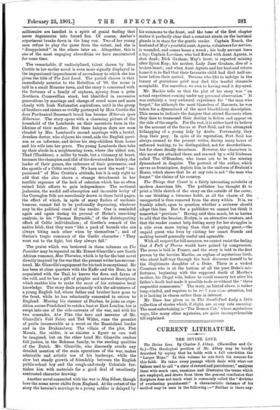NOVELS OF THE WEEK.*
Mn. FRANKFORT MOORE has given us such excellent and wholesome diversion in According to Plato that we have no desire to lay undue stress on the extreme artificiality of the idie mere of his plot. We resign ourselves without a murmur to the extreme improbability that a man guilty of forgery should allow a dying friend to bear the blame, and on the recovery of the dying man should acquiesce in his friend's prosecution, conviction, and transportation, and, more wonder- ful than all, should himself thereafter lead a blameless, pros- perous, and self-satisfied life. We reconcile ourselves to all this because after all the plot is here a minor matter, the story being a spirited and entertaining fantasia rather than a serious presentment of life. Besides, the plot comes in very handily at the end to secure the happiness of the hero, who happens to be the victim's son, and in general to promote the triumph of true love as opposed to interested . fortune- hunting. But the real attraction of the book is centred in the relations between Miss Amber Severn, the only daughter of an extraordinarily gifted man of science, and the troop of young men whom she is bent on " improving " through the medium of a perfectly colourless friendship. Amber, who has been brought up in an atmosphere of experimentation, and is full of ingenious ideas, proceeds on the dangerous assumption that if a charming girl only defines her position at the outset she can get young men to follow her advice implicitly about the shaping of their careers without misinterpreting her interest or exacting any sentimental return for their obedience. So she induces a young English poet to go on the Stook Exchange, a shrewd young Seotchman to start business as an advertising agent on entirely new lines, and an Australian millionaire to attend the lectures at a School of Literature run by a voluble adventurer named Richmond. All these young men are caricatures, but the caricature is legitimate, and the scenes at the School of Literature, the financial education of the poet-stockbroker, the audacities of the advertising agent, and the self-revelations of the stingy • (I ) According to Plato. By F. Frankfort Moore. London Hutchinson and Co. E6s.3 — (2.) The Lost Land a Tale of a Cronswenian-lrish Town. Being the Autobiography of Mies Annita Lombard, 1780-1797. By Julia M. Crottie. London : Fisher Unwin. [6s.]—(3.) Max Thornton. By Ernest Glanville. With 8 Illustrations by James Shaw Crompton, ILL London: Chatto and Windt's. [6a.]—(4.) May Silver. By /Alan St. .Aubyn. London F. V. White. [65.]—(5.) The Man who Forgot. By Jolla Mackie. London.: Sarrold and Sons. (611.3—(6.) The Things that Count. By Elizabeth Knight Tompkins. Lonclon : G. P. Putnam*e Sons. Des ]. —(7.) 4 Path of Pitons& By Ernest A. Vizetelly. London Chatto and Windus._ _ 16e.3--Q3.) The Smell' Part Lady, de. By G. R. Sims. London Chatto and Windus. 6d.]
millionth* are handled in a spirit of genial fooling that never degenerates into forced fun. Of course, Amber's experiment breaks down in the long run. Two of her young men refuse to play the game from the outset, and she is "disappointed" in the others later on. Altogether, this is one of the most engaging absurdities we have encountered for some time. • The remarkable, if undisciplined, talent shown by Miss Crottie in her earlier novel is even more signally displayed in the impassioned impeachment of ascendency to which she has given the title of The Lost Land. The period chosen is that immediately anterior to the Rebellion of '98, the scene is laid in a small Munster town, and the story is concerned with the fortunes of a family of orphans, sprung from a grim Northern Cromwellian stock, but identified in successive generations by marriage and change of creed more and more closely with Irish Nationalist aspirations, until in the group of brothers and sisters so vividly portrayed by Miss Crottie the dour Puritanical Sassenach brood has become Hibernis ipsis Hibernior. The story opens with a charming picture of the household of the Lombards on their mountain farm in the lifetime of their mother. But these halcyon days are soon clouded by Mrs. Lombard's second marriage with a brutal, drunken doctor, who abjures his creed, aids the English garri- son as an informer, and drives his step-children from home and his wife into her grave. The young Lombards then take up their abode in a neighbouring town, where the eldest son, Thad (Thaddeus), a miller by trade, but a visionary at heart, becomes the champion and idol of the downtrodden Irishry, the leader of their games, the redresser of their grievances, and the apostle of a Celtic revival. We have used the word " im- passioned." of Miss Crottie's attitude, but it is only right to add that she also shows a strange detachment in her terrible exposure of the lack of cohesion which has so often ruined Irish efforts to gain independence. The sectional jealousies, the sordid self-absorption and incurable levity of the Cmraglen folk are mercilessly drawn in these lurid pages, the effect of which, in spite of many flashes of sardonic humour, cannot fail to be profoundly depressing, whatever may be the political creed of the reader. One is reminded again and again during its perusal of Heine's searching analysis, in his "Thomas Reynolds," of the disintegrating effect of Celtic individualism; of Goethe's remark of the native Irish, that they were "like a pack of hounds who are always biting each other when by themselves " ; and of Ossian's tragic summary of the Gaelic character : "They went out to the fight, but they always fell."
The praise which was bestowed in these columns on The Fossicker may be repeated on Mr. Ernest Glanville's new South African romance, Max Thornton, which is by far the best novel directly inspired by the war that the present writer has encoun- tered. Mr. Glanville's equipment for his task is exceptional. He has been at close quarters with the Kaffir and the Boer, he is acquainted with the Taal, he knows the flora and fauna of the veld, and he has a gift of graphic and natural description which enables him to make the most of his extensive local knowledge. The story deals primarily with the adventures of a young English lad, whose father and brother have gone to the front, while he has reluctantly consented to return to England. Missing his steamer at Durban, he joins an expe- dition across Pondoland to catch a boat at East London, but is swept into one of the side-currents of the war, and with his two comrades, Abe Pike (the hero and narrator of Mr. Glanville's Veld Tales) and Ted Willet, runs the gauntlet of perils innumerable as a scout on the Basutoland border and in the Drakensberg. The villain of the plot, Piet Marais, the raider, is as sinister a figure as can well be imagined, but on the other hand Mr. Glanville renders full justice, in the Bokman family, to the sterling qualities of the Dutch. Mr. Glanville, who discreetly avoids any detailed mention of the main operations of the war, makes admirable and artistic use of his landscape, while the slow but steady growth of friendship between the English public-school boy and the rough-and-ready Colonials fur- nishes him with materials for a good deal of excellently contrasted character drawing.
Another novel connected with the war is May Silver, though here the scene never, shifts from England. At the outset of the story the heroine's marriage to a young soldier is delayed by his summons to the front, and the tone of the first chapter makes it perfectly clear that a constant strain on the lacrimal glands is in store for the gentle reader. Captain Reach, the husband of May's youthful aunt, Agneta, volunteers for service, is wounded, and comes home a wreck ; his body servant loses a leg; Captain Lovelace, who had flirted with Aunt Agneta, is shot dead; Dick Graham, May's lover, is reported missing after Spion Kop ; his mother, Lady Jane Graham, dies of a broken heart; and when Aunt Agneta and her husband return home it is to find that their favourite child had died half-an- hour before their arrival. Persons who like to indulge in the luxury of gratuitous grief may find this tearful chronicle acceptable. For ourselves, we own to having read it dry-eyed.
Mr. Mackie tells us that the plot of his story was "an actual experience coming under my personal observation." It was certainly a very awkward experience for "the man who forgot," for although the most blameless of Baronets, he was taken for a dynamitard of the most bloodthirsty description. This seems to indicate the dangers that attend Baronets when they dare to transcend their destiny in fiction and appear on the side of the angels. For the rest, it is rather hard to believe in the account of the fracas at Port Said, and the attempted kidnapping of a young lady by Arabs. Fortunately, they drop their prey. In spite of its reputation, Port Said has always seemed to the present writer, during many hours of enforced waiting, to be distinguished, not for disorderliness, but for sheer deadly dreariness. However, the characters in this novel are attacked there, and rescued by a wild Irishman called The O'Donohue, who turns out to be the missing dynamitard in disguise. The portrait of the author, which serves as frontispiece, depicts him in the uniform of Brabant's Horse, which shows that he at any rate is not "the man who forgot" the claims of his country.
The Things that Count is a fairly interesting novelette of modern American life. The publisher has thought fit to print a little sketch of the story on the outside of the cover, to our thinking a tiresome habit, as all the charm of the unexpected is thus removed from the story within. It is, we frankly admit, open to question whether a reviewer should adopt this line. But for a publisher we cannot but think it somewhat "previous." Having said thus much, let us hasten to add that the heroine, Evelyn, is an attractive creature, and that the reader cannot help feeling sorry for her struggles in a role even more trying than that of paying guest,—the unpaid guest who lives by visiting her smart friends and making herself generally useful and agreeable.
With all respect for full measure, we cannot resist the feeling that A Path of Thorns would have gained by compression. The scene is laid in France, and the story is told in the first person by the heroine Marthe, an orphan of mysterious birth, who about half-way through the book discovers herself to be the illegitimate daughter of a Duke. There is a wicked Countess who is at the bottom of all the poor Duke's mis- fortunes, beginning with the supposed death of Marthe's mother, his illegal wife, before he could remarry her after his father's death had made it possible to do so without the "three respectful summonses." The story, as hinted above, is rather long-winded, and requires to be re^.1 witn close attention, but it is lacking in charm rather than in interest.
Mr. Sims has given us in The Small-Part Lady a little collection of stories which, if slight, are at any rate amusing. The most entertaining is "The Demon Cat," whose mysterious ways, like many other mysteries, are quite incomprehensible till explained.







































 Previous page
Previous page